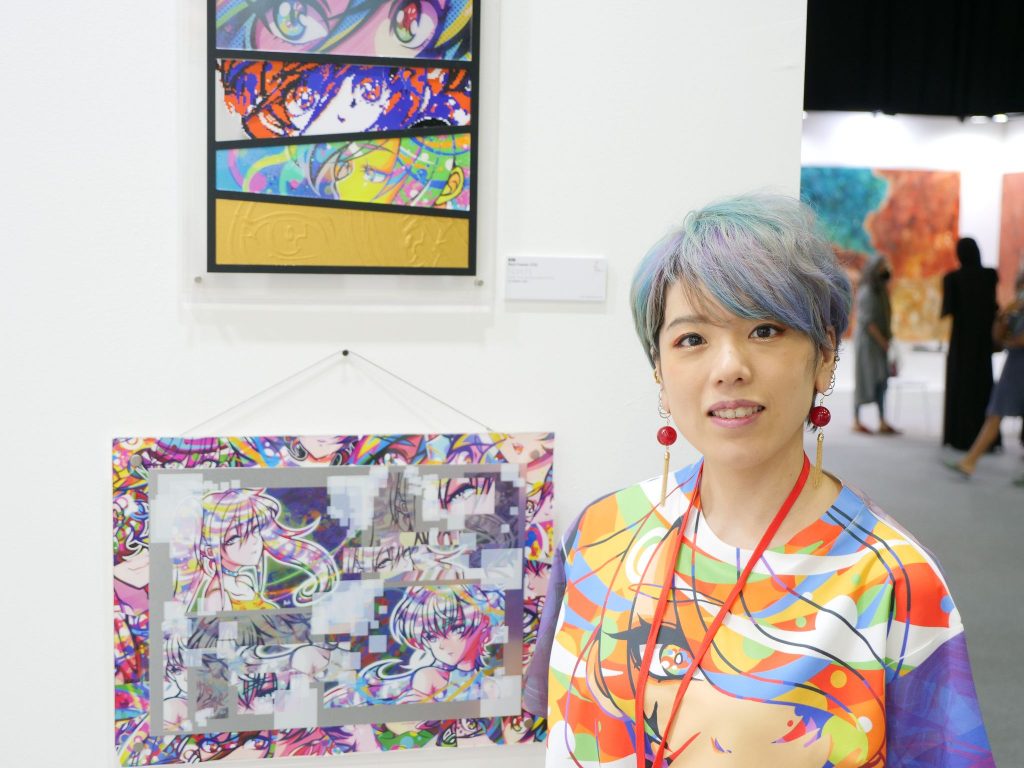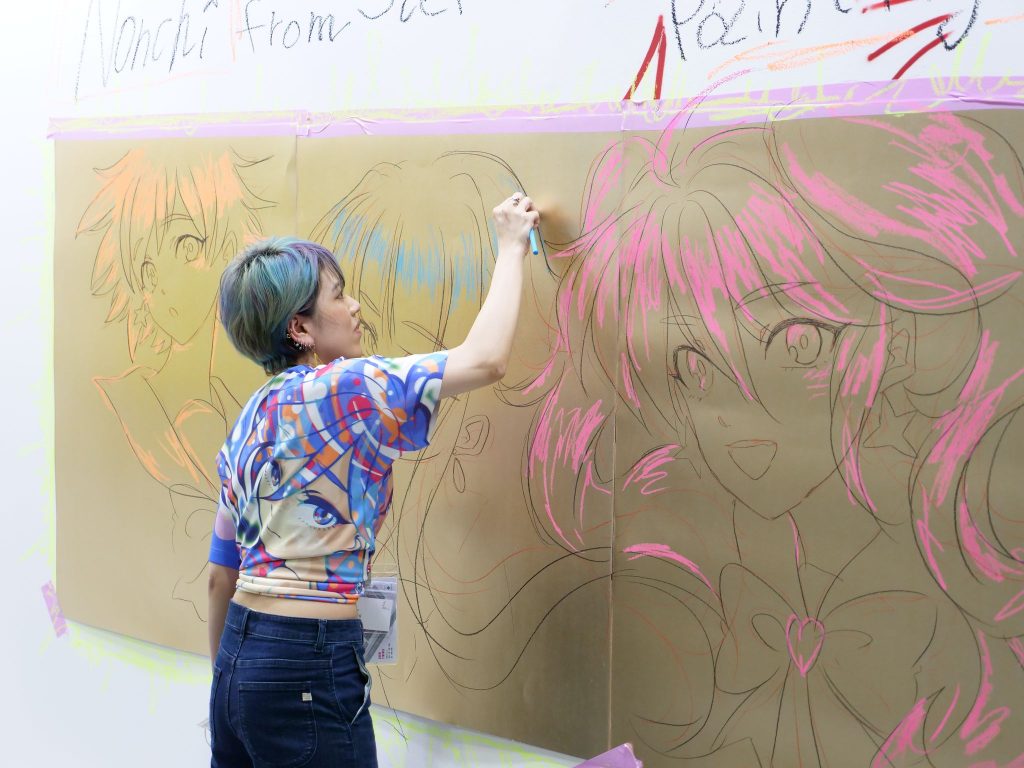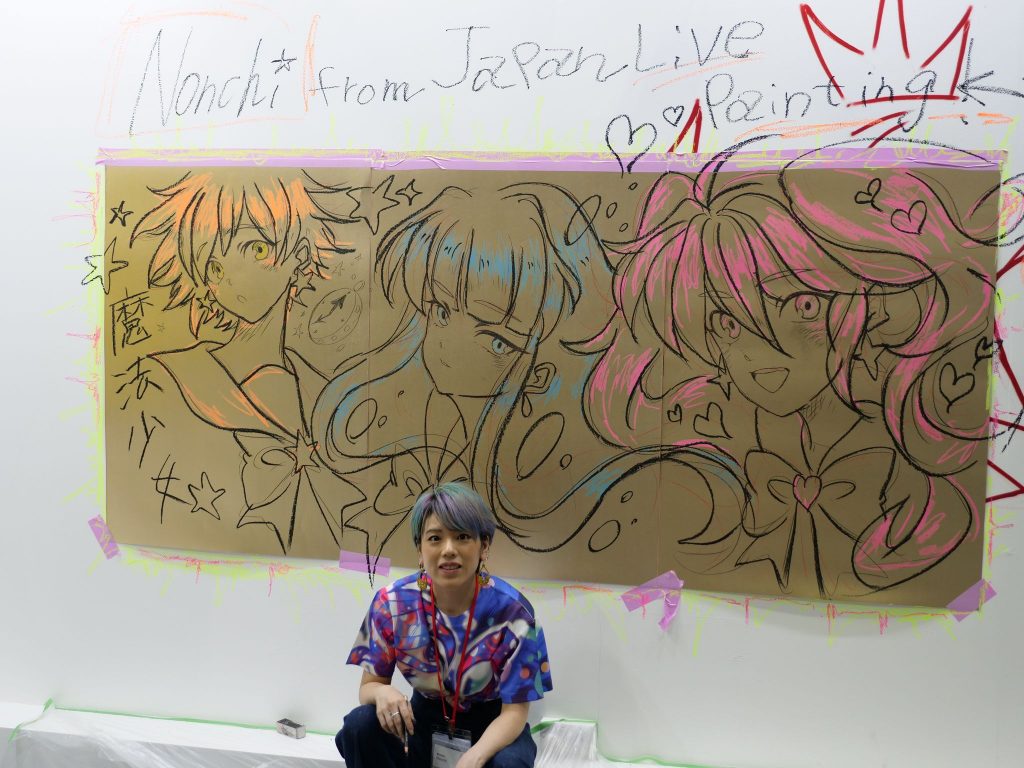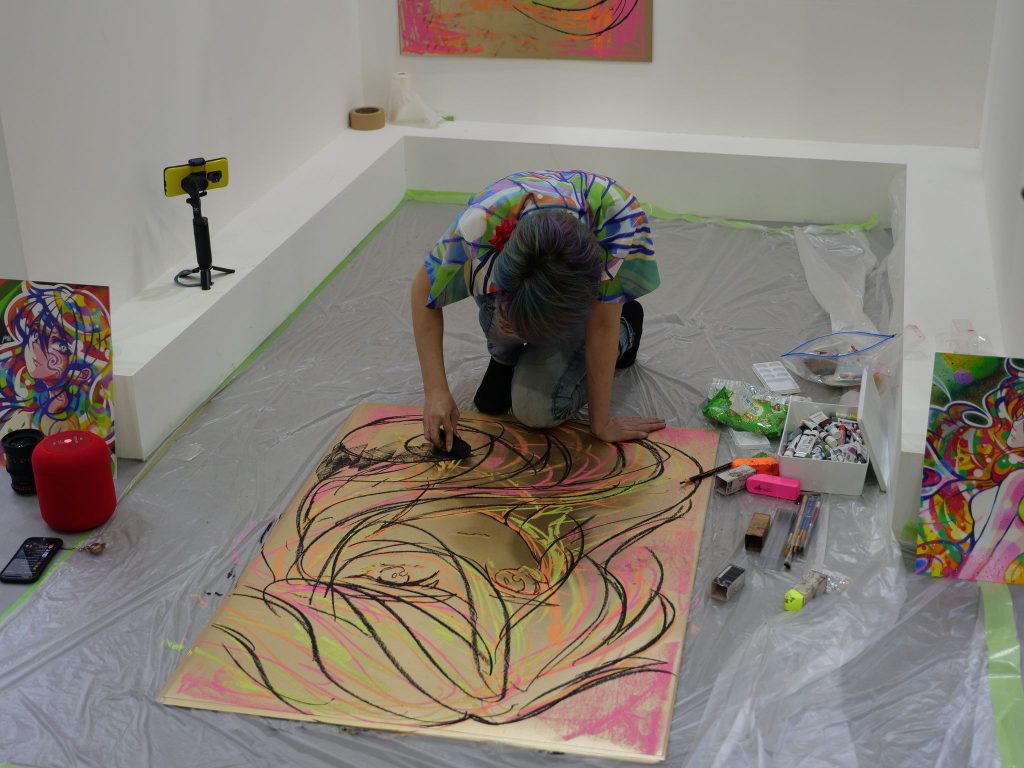







Amin Abbas
DUBAI: Japanese artist Nonchi composes her art using colors and lines reminiscent of Japanese animation and manga from the 1980’s and 90’s. She is also a singer and lyricist.
Nonchi participated at World Art Dubai’s Japanese Pavilion this year.
In an exclusive interview with Arab News Japan, Nonchi shared her inspiration for art, saying that when she created art, her inspiration was, simply put, people.
“The shape and movement of each person’s spirit, what we see on the surface, and what is inside all have different shapes, colors, temperatures, and textures, and the distortion is irresistible. When I see them, I want to paint the minds and souls of the people,” she explained.
“I love pop art. Among them, I like works that make me feel the people. This is the same as the source of inspiration because I can feel each distortion that human beings have. And at the same time, I think art is in everything. Manga, anime, video games and other things that I touch every day are also art that I love and am moved by.”
“Of course, I am blown away by the world of historical masterpieces, and I love those works of art. And equally important to me is the subcultural influence of art,” she added.
About the most inspirational thing from Japanese culture that she has adapted into her daily life, Nonchi said: “In a strange way, I have been inspired by manga, anime, and video games from an era even older than my childhood. And I would love to go back to the 1980’s. This may be something to do with the influence of the games I enjoyed with my father, or perhaps it is the manga that my father let me read. The slightly rough-looking people in these stories fit very comfortable with the waves of my heart. And they make me feel like I want to draw their power and passion.”
About the establishment of his career as an artist, Nonchi said: “I don’t remember when I started painting. Because I found myself fascinated by painting from a very young age, painting means the same as breathing for me.”
“And consistently, what I wanted to paint were people. I always looked at different people, imagined their hearts, and tried to paint their spirits. Especially in their distortions, that is what I feel most human. The different hearts of each person, and the mind that changes every second, are what I want to depict.”
“I don’t remember anything about my early projects because I was so traumatized that I didn’t know that time. When I’m painting, I feel like I’m drawing in another world because I’m detached from everything else, from time and my surroundings. And the work I have finished painting is already in the past. So, I always want to paint the next one as soon as possible,” she added.
Nonchi is known for her art style in 1980’s & 1990’s anime & manga touch, she shared with Arab News Japan the story and inspiration behind it: “I feel that I was a person who spent my youth in the 1980’s, but somehow, I was wrongly transported to this time 40 years later. I don’t know exactly why I like the 1980’s, but it fascinates me anyway. Maybe it is because the characters are rough, immature, but passionate, powerful, and full of determination to keep moving forward. This is probably connected to my painting theme of ‘distortion = humanity’ as a person.”
“The 1980’s in Japan was a time when everything was constantly progressing. Especially in the manga and anime industries at that time, many people devoted their passion, time, and skills to these fields, and I think it was a luxurious time. Of course, I also check out new works that come out now. It’s all great and always keeps me hooked!” she added.
About the challenges that she faced during her projects, Nonchi said:” When I used to paint with analog materials, I had problems waiting for the paint to dry out. I would get ideas for paintings one after another, and I would want to paint something else while waiting for them to dry. However, it was difficult for me to concentrate on painting more than one picture at a time”.
“So, I started painting digitally with a computer to cut downtime to dry paints. At first, I felt the difference in expression between analog and digital painting materials. Then, I got used to it and was able to paint as many as 450 pictures in one year”.
“But that is not all. I would pick out my favorites from those many paintings and add the final expression with analog painting materials. After all, my work is not complete unless both analog and digital are used,” she added.
Nonchi visited Dubai in 2022, and was totally new to the customs, scenery and language.
“Being touched by this beautiful culture made me feel more comfortable than in Japan,” she explained. “I think that Japanese culture is bound by so many rules. And many Japanese people consider art to be an academic thing. Being a ‘painter’ in that society often feels too tight for me. But when I came to the Middle East, I found that many people enjoy the paintings freely and view them with interest, respect, and joy. I’m happy that I came to the Arab world for the first time. In fact, I already feel like returning to the Middle East. I really want to thank the people in this city from the bottom of my heart,” she added.
About her recommendations for those who wants to be an artist, Nonchi said: “Your art is always inside you, and it will never be disturbed by anyone. I always feel down about myself, but you are always the best you in the world, no matter what other people say about your work. The art you love will always be with you.”